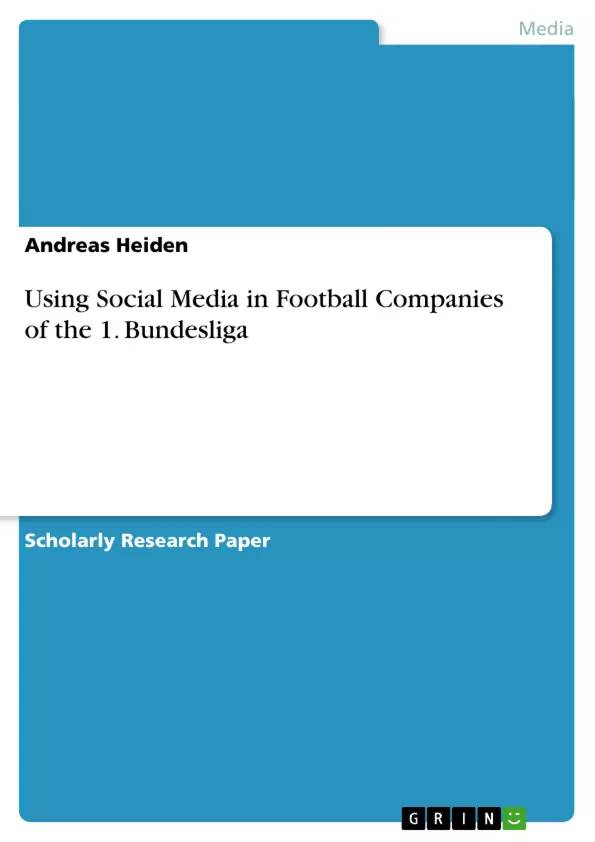Who thinks that football enterprises are only clubs is not right. Football clubs are even more big companies and its work has grown up. “Who thought that Bundesliga clubs only meet for a sporty competition should have a look into the companies register.”(11 Freunde, P. 42, 2010) From the Bayern München AG to the St. Pauli Marketing GmbH, companies and professional trade have taken place in the Bundesliga.
The question is why does the Bundesliga need social media and why is social media a good instrument in the football business?
Football is probably the most popular sport in the world; about 174 million people in Europe are interested in it which makes about 71 percent. In Germany it is about 81 percent of the population. Because of this huge sympathy an economically coefficient grows out. (Comparative Sponsors, P. 32, 2009) Such loyal fans can bring more sales and the companies are not that forced to be successful in its sport. Football is also a European competition between clubs to get the best players, sponsors and the best sales. The clubs can influence the fans to buy more products or even attract new fans. A popular instrument to get attention and to get a better costumer relationship is using the social media.
Inhaltsverzeichnis (Table of Contents)
- Introduction
- Social Media
- Online communities in football
- Chances for the football company's
- Conclusion
Zielsetzung und Themenschwerpunkte (Objectives and Key Themes)
This document explores the use of social media by football companies in the 1. Bundesliga, examining its potential benefits and examining how these companies leverage social media platforms to connect with fans and enhance their business operations.
- The growing importance of social media in the football industry
- The role of social media in building online communities and fan engagement
- The opportunities social media presents for football companies to increase brand awareness and marketing reach
- The specific functionalities and applications of social media platforms within the context of football clubs
- The evolution of social media as a tool for communication, interaction, and business development in the modern football landscape
Zusammenfassung der Kapitel (Chapter Summaries)
The introductory chapter delves into the evolution of football clubs as businesses, emphasizing their increasing reliance on professional business practices. The text highlights the substantial economic influence of football in Germany, demonstrating its immense potential for generating revenue and influencing consumer behavior.
The second chapter offers a broad definition of social media, outlining its functionalities and applications. It explores various social media platforms, including blogs, forums, social networks, and micro-blogging services, examining their specific features and potential for user interaction and content creation.
The chapter delves into the role of social media in fostering online communities within the realm of football. It explores how these platforms facilitate communication, collaboration, and the sharing of information among fans, players, and clubs.
The text concludes with a discussion of the various opportunities that social media presents for football companies. It examines how these platforms can be leveraged for marketing, brand promotion, fan engagement, and the development of new business strategies.
Schlüsselwörter (Keywords)
The key concepts of this work encompass the utilization of social media platforms, online communities, fan engagement, business development, and marketing strategies within the context of football clubs. The document focuses on the impact of social media on the modern football industry, exploring its application in fostering community, enhancing brand awareness, and promoting business growth.
Why do Bundesliga clubs act as commercial companies?
Modern football clubs are large-scale enterprises that require professional business structures, marketing, and revenue generation to compete for the best players and sponsors.
What are the benefits of Social Media for football clubs?
Social media allows clubs to build online communities, increase brand awareness, and foster a direct relationship with fans, which can lead to higher sales and loyalty regardless of sporting success.
Which Social Media platforms are most relevant for the Bundesliga?
Clubs use a variety of platforms including blogs, forums, social networks, and micro-blogging services to share content and interact with their global fan base.
How does fan loyalty impact a club's economic stability?
Loyal fans are more likely to purchase merchandise and tickets consistently, providing a stable revenue stream that makes the company less vulnerable to temporary declines in match results.
How popular is football in Germany compared to the rest of Europe?
While about 71% of Europeans are interested in football, the interest in Germany is significantly higher at approximately 81% of the population.



